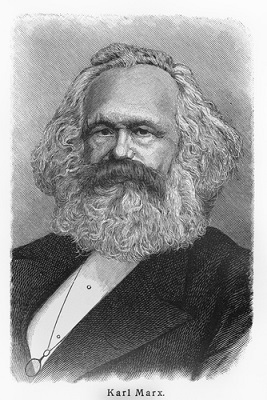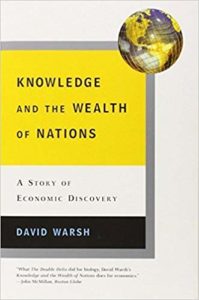

As I mentioned yesterday, I’m enjoying David Warsh’s Knowledge and the Wealth of Nations immensely. I’ll be posting highlights over the next few days.
Discussing Karl Marx’s ideas about socialism, Warsh writes:
It was at this point in the argument that the arm-waving began in earnest. What would life be like after the revolution? Afterwards, Marx said in one famous aside, the division of labor would all but disappear, and a man might fish in the morning, hunt in the afternoon, rear cattle in the evening, “philosophize after dinner,” just as he desires, “without ever becoming hunter, fisherman, shepherd, or critic.” If that sounds like a description of middle-class retirement living in the industrial democracies today, surely it is an accident.
I love Warsh’s humor.
And later on the same page, Warsh writes:
His [Marx’s] fundamental disagreements with the English economists became more and more obscure. Ricardo had believed that growth would cease because of the scarcity of natural resources. Marx believed it would continue because of the growth of knowledge.
Thus my reference to Marx being an early Julian Simon.

READER COMMENTS
Hazel Meade
Dec 5 2018 at 4:48pm
Funny, I have often thought of the same quotation and how easy it is for many people today to achieve just that lifestyle, either via retirement, or by more or less “dropping out” and living like hippies. If you’re willing to put up with a lot fewer creature comforts you can live on a lot less money and retire much sooner.
David Henderson
Dec 5 2018 at 5:35pm
Good point. I hadn’t thought about the Karl Marx comment in the context of modern life until Warsh pointed it out.
Mark Z
Dec 5 2018 at 6:11pm
‘Analytical Marxists’ often attempt to rehabilitate Marxism by recharacterizing it as merely a variation of technological determinism, and that the utopian endpoint of history is simply the point where production technologically advanced and automated that we can all basically subsist without having to do much or any necessary ‘unfulfilling’ work at all. In that interpretation, Marx’s main mistakes I guess were 1) thinking that this was technologically possible in the 19th century and 2) thinking that any sort of revolution was necessary to bring it about.
Of course, some people will always choose to work, both because they don’t like idling and because, even if all our needs can be met while doing little or no work, most people will still always find new things to want beyond material subsistence; while others, as you note, will be satisfied with the subsistence (or what our age defines as subsistence) they can get with minimal labor.
David Henderson
Dec 5 2018 at 9:27pm
But his HUGE analytic mistake was thinking that socialism would work.
Hazel Meade
Dec 6 2018 at 11:15am
Or thinking that socialism was needed to bring it about. If you can drop out of society and live like a hippie on your own, what do you need a central organizing committee for? If you want to live on a hippie commune nobody is stopping you right now.
Miguel Madeira
Dec 8 2018 at 7:06pm
I think that in Marxist philosophy was implicit that higher productivity will create higher unemployment, and that the only way for higher productivity to create a leisure sociey is if the “means of production” are owned by all people.
Mark Z
Dec 8 2018 at 10:27pm
The failure of higher productivity to lead to sustained higher unemployment was evident even by Marx’s time. Standard economic theory – that as workers’ real wages increased (as they did) their valuation of their free time would increase and they would work fewer hours (they did this as well) – proved more prescient on the matter of leisure as well.
Hazel Meade
Dec 10 2018 at 10:48am
@Miguel
That’s probably what a Marxist would argue, but it seems like it can be more readily achieved by the broad lowering of prices enabled by a highly competitive capitalist market. As a percentage of the household budget, food costs have fallen from 40% to 10% over the last half century. Clothing is even more easily obtained, probably for free if you don’t care what it looks like. The main issue today is housing, but even that can be cheap if you don’t desire to live in or near a city – and the main reason it is expensive is largely *because* of market interventions by popular demand. So to me it seems like the idea that public ownership of the “means of production” was necessary to create a leisure society was a collosal mistake. In a highly advanced capitalist society, people can trade income for leisure fairly readily – if they are willing to give up some of the amenities of modern houses and cars and entertainment. Note that Marx’s quotation pertains to a simple rural lifestyle – I doubt he even imagined that people would desire dining out three times a week, annual vacation trips around the world or television or any of the other entertainments we have now.
JK Brown
Dec 7 2018 at 2:30am
Did you catch the most recent Uncommon Knowledge with Thomas Sowell? Another great quote from Mr. Sowell
“Socialism is a great idea. That does not mean it’s a great reality”
—Thomas Sowell
David Henderson
Dec 9 2018 at 11:37am
I didn’t. I disagree with him, though. I don’t think socialism is a great idea and I don’t think you can judge its greatness separate from its reality.
Moreover, if what he meant is that socialism would great if forced redistribution and regimentation of labor would work–the latter, by the way, was admitted by socialist Robert Heilbroner–then I disagree. Even it worked, it would be horrible to use force on innocent people in their daily lives.
john hare
Dec 6 2018 at 5:12am
A business associate said that a very smart man once told him, “if you want to make a living, give people what they need, but if you want to get rich, give them what they want.” There will always be some ambitious people that want more than whatever is available.
Comments are closed.